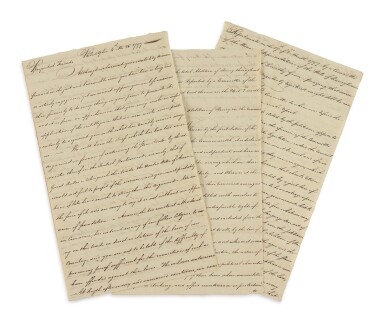Fine Books and Manuscripts
Fine Books and Manuscripts

(Abolition) | Four documents from the Pennsylvania Society for Promoting the Abolition of Slavery
No reserve
Lot Closed
December 16, 08:11 PM GMT
Estimate
8,000 - 12,000 USD
Lot Details
Description
(Abolition)
Four documents from the Pennsylvania Society for Promoting the Abolition of Slavery
Together, 4 items. Autograph document in a secretarial hand, 2 pp. (12 5/8 x 8 in.; 327 x 203 mm), Philadelphia, 17 March 1797, to the London Society for Promoting the Abolition of Slavery -- Autograph document in the the same secretarial hand, 4 pp. (12 5/8 x 8 in.; 327 x 203 mm), Philadelphia, 26 April 1797, to the London Society -- Autograph document in a secretarial hand, 2 pp. on bifolium with integral blank (12 7/8 x 8 in.; 328 x 203 mm), Philadelphia, being "An Act for the abolition of Slavery in the Commonwealth of Pennsylvania, 24 March 1797 -- Autograph document in a secretarial hand, signed by James Milnor and Timothy Paxson, 1 p. (13 1/4 x 8 in.; 338 x 203 mm), Philadelphia, 4 January 1799, being a resolution extracted from the minutes; separation at two horizontal folds with some paper loss and loss of approximately five words (this applies to last document only).
A very fine small archive of documents from the first abolition society in America, The president of the Pennsylvania Society for Promoting the Abolition of Slavery was Benjamin Franklin. Its London counterpart's membership included Granville Sharpe, William Wilberforce, and Hannah More. The present lot includes three documents laying out coordinated strategies for the Pennsylvania and London Societies.
In the first letter, the American Society urgently desires that the London Society have clarity about recent cases involving American slave traders. The argument in Parliament was that abolishing slavery in England would only strengthen the United States, whom they assumed to be thirsty for more revenge against the Crown. This was decidedly not the case legislatively, and the Americans were keen to give the London Society proper information, so that abolition in England is not set back. They further discuss the arrest of several slave runners who are American, but had been supplying slaves to other parts of the world, request records from Sierra Leone that would incriminate any Americans they could pursue on criminal charges, etc.
The second document is the report of a legislative case sent to the London Society as an example of how the Americans were pursuing emancipation strategically in Pennsylvania. Knowing that immediate emancipation would not be tolerated, they first required that all slaves be registered according to strict regulation. Any breach of the process was immediately pursued. In the case of Timothy Green, recorded here, he failed to record his slaves' names on the register. The Society seized the slaves for Green's non-compliance and won their emancipation. They also forbade the import of new slaves. Essentially, they created a choke-point where slaves were being freed on technicalities, their children were not able to be enslaved, and new slaves could not be imported.
The third document is a communication to the London Society recording a critical piece of legislation put before the Pennsylvania Legislature, arguing for perhaps the first time in American history that the rights and privileges afforded to American citizens by the Constitution of the United States, and the State Constitution of Pennsylvania, belonged equally to black citizens, mulatto citizens, etc., It was a radical, pivotal argument that, when passed, paved the way for the ultimate abolition of slavery. All the rights argued for over the next 68 years, leading up to the Emancipation Proclamation, flowed out of that singular legislative idea.
The final document, not in sequence with the other three, is an original Society resolution commending famed abolitionist attorney James Ross for his work for the emancipation of slaves.
Rare. Documents from the Pennsylvania Society for Promoting the Abolition of Slavery are scarce on the market.
